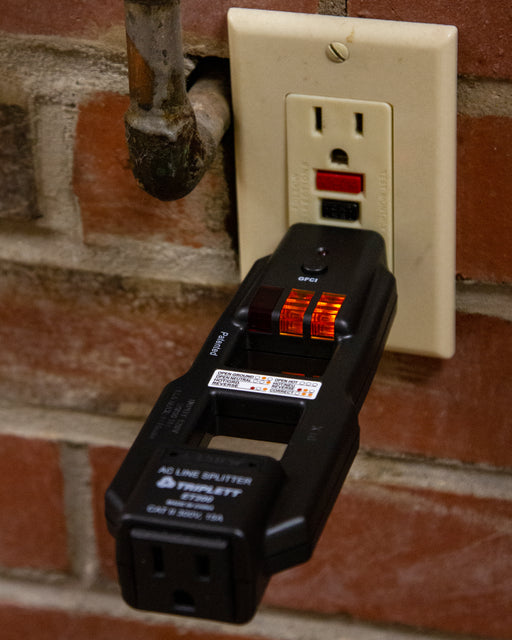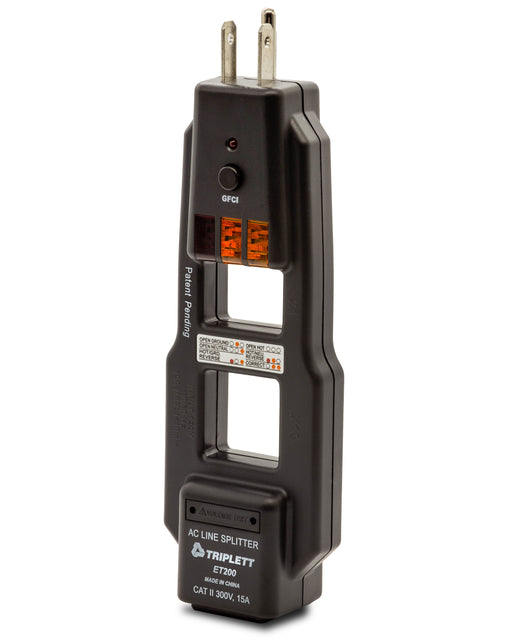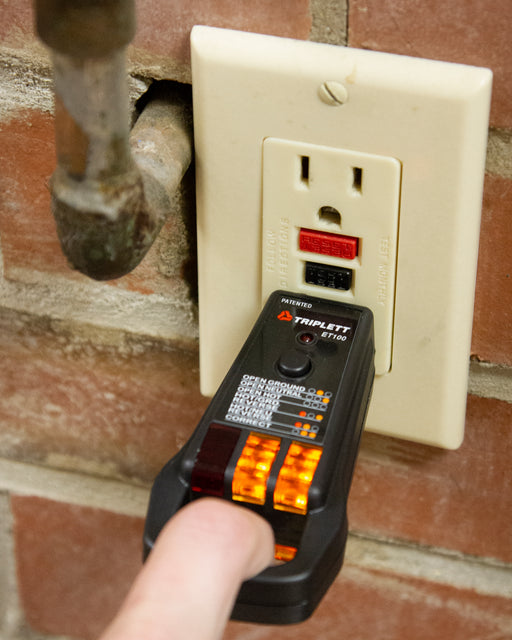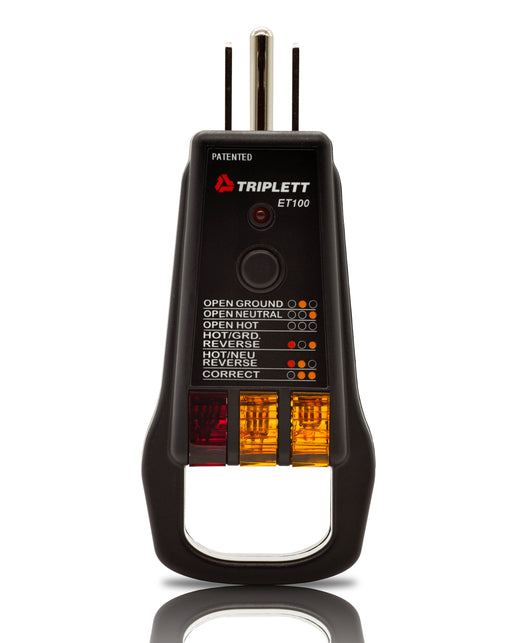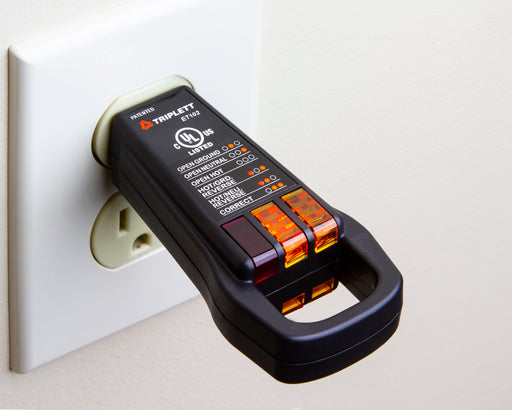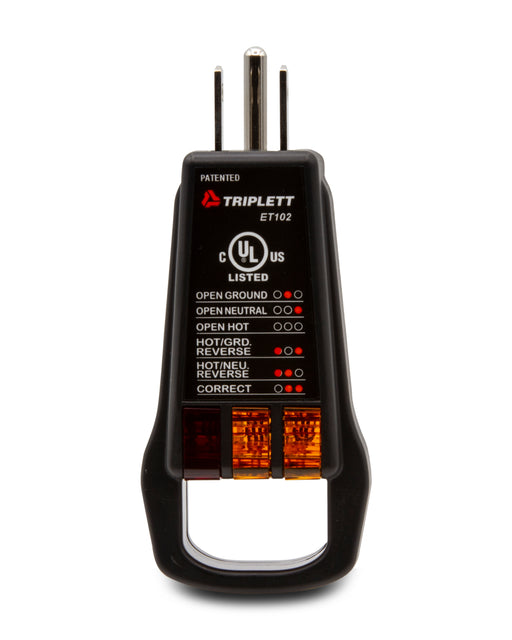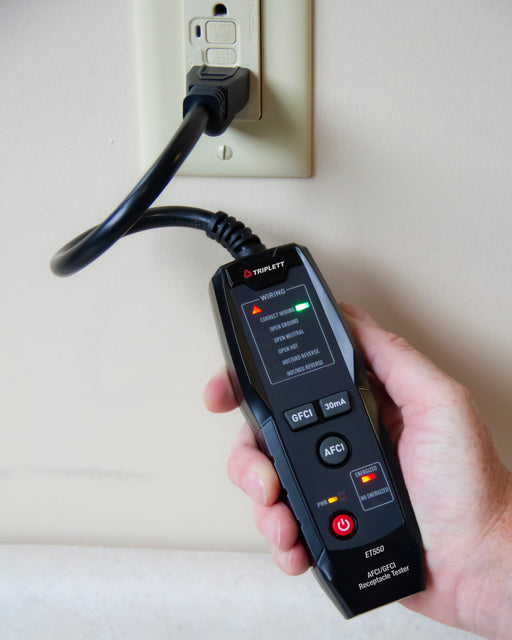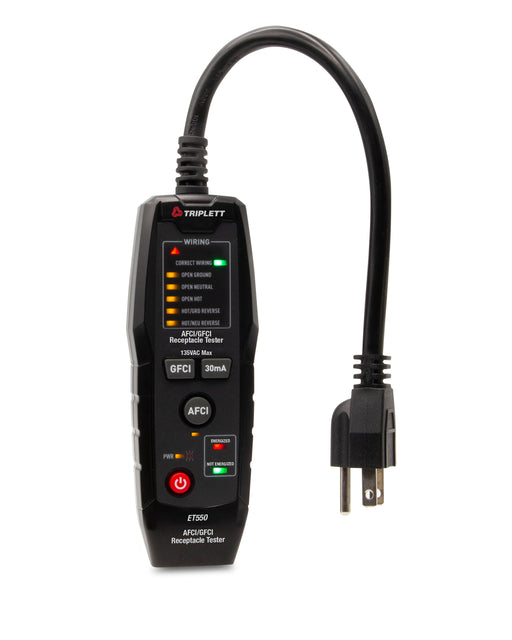Know More About Triplett GFCI receptacle tester
What is GFCI receptacle tester?
A Ground Fault Circuit Interrupter (GFCI) tester is used to test the functionality of GFCI outlets and circuits. It is a safety device that monitors the flow of electricity and can quickly shut off power if it detects a ground fault or imbalance. In other words, A GFCI tester is specifically made to simulate ground faults and test the response of the GFCI device. It typically has a series of buttons or switches that can be pressed to create various fault scenarios. When the tester is connected to a GFCI outlet, it will specify whether the device is functioning properly or if it demands replacement or repair. Needless to say, GFCI testers are a critical part of electrical safety inspections and maintenance. It enables professionals to quickly and accurately determine if GFCI outlets are offering the necessary protection as expected. Additionally, these are immensely helpful for homeowners to regularly test GFCI outlets, and thus ensure the safety of their electrical system.
Purpose and Importance of GFCI Receptacle Testing
GFCI (Ground Fault Circuit Interrupter) receptacle testing is a critical practice to ensure electrical safety, particularly in environments where water and electricity are in close proximity. GFCIs are designed to swiftly detect ground faults and interrupt the electrical circuit to prevent electric shocks. Regular testing of GFCI receptacles holds immense significance for several reasons:
- Preventing Electric Shocks: The primary purpose of GFCI receptacle testing is to prevent electric shocks. GFCIs monitor the flow of electrical current and quickly respond to any imbalance caused by ground faults, instantly shutting off power. Testing confirms that GFCIs can effectively protect individuals from shocks.
- Ensuring Human Safety: GFCI receptacles are essential for areas where water exposure is common, such as bathrooms, kitchens, and outdoor spaces. Regular testing ensures that these outlets function as a safety net, minimizing the risk of electrocution, especially in damp environments.
- Compliance with Safety Regulations: Many electrical codes and regulations mandate the installation of GFCI receptacles in specific locations. Regular testing ensures compliance with these safety standards, which is crucial for legal adherence and the well-being of occupants.
- Verification of Proper Functionality: Over time, GFCI receptacles might become less sensitive due to wear and tear or other factors. Testing them verifies that they trip appropriately when exposed to ground faults, maintaining their lifesaving functionality.
- Preventing Electrical Fires: GFCI receptacles not only protect against shocks but also minimize the risk of electrical fires. By promptly cutting off power upon detecting a ground fault, they prevent overheating and potential fire hazards.
- Identifying Malfunctions:Testing GFCI receptacles helps identify faulty or malfunctioning units. If a GFCI doesn't respond as expected during testing, it indicates the need for replacement or repair to ensure continuous safety.
- Real Estate Transactions: In property transactions, GFCI receptacle testing is essential for providing information about the safety of the electrical system. Buyers and sellers can make informed decisions based on the results of these tests.
- Promoting Electrical Safety Awareness: Regular GFCI receptacle testing raises awareness about the importance of electrical safety. It encourages individuals to understand the role of GFCIs and to prioritize safe practices, both at home and in commercial settings.
- Quick Fault Detection: GFCI testing helps promptly identify any issues with the receptacles. Detecting problems early prevents potentially dangerous situations from arising and allows for timely repairs or replacements.
In conclusion, GFCI receptacle testing is crucial for safeguarding lives and preventing electric shock incidents. It ensures compliance with regulations, promotes electrical safety awareness, and underscores the role of GFCIs as vital safety devices. By conducting regular tests, individuals contribute to creating safer living and working environments.
How to test a GFCI outlet with a 3-wire receptacle tester?
A 3-wire receptacle tester is typically used for to checking wiring issues in 3-wire outlets and the GFCI functioning. These receptacle outlet testers are quite handy and easy to use. This device checks the current flow from one end to the other and check for fluctuations in the current. This helps avoid risky situations and mishaps as well as ground faults and other types of shocks. It measures the current flow and identifies any need for wiring repairs or replacements. It compares if the amount of current flowing from one end to the other is the same as the amount of current coming back to the first end. If there are any discrepancies here, the GFCI will shut off. This is done simply by pressing the button on GFCI. This is an essential activity carried out in sensitive areas such as if the electrical wiring is close to a water storage unit or even in residential and commercial buildings. We offer these testers with easy-to-read dual side displays to see the fault charts.
Why use GFCI testers to check electrical outlets?
This is a compact and handy but an essential instrument. With a simple process, you can easily find wiring faults and avert shocks and short circuits. They are recommended for every electrician to know the electrical status in an area on an almost daily basis. The safety of people around is of paramount importance, and this is the easiest and the most accurate way to assure electrical safety and mitigating risks.
Triplett focused on quality and accuracy of our probes and tools, and the same applies for our GFCI testers as this is an important device which saves lives and property. We have an extremely resourceful team, and they can guide you in selecting the best GFCI outlet tester based on your requirements such as frequency is usage.
Does GFCI Tester Work on Regular Outlet?
Regular outlets can be tested with a GFCI tester, but they will not trip the circuit like a GFCI outlet will. This is because regular outlets are not designed to protect against electrical shocks. If you are using a GFCI tester on a regular outlet, it will simply tell you whether or not the outlet is receiving power. At times, it may trigger an interrupter in the circuit. You can reset this interrupter by locating it.
How does a GFCI Receptacle Tester Work?
The outlet GFCI tester is equipped with LED lights and, in some cases, a display screen to show various test results. The tester can identify several wiring problems, including open ground, reversed polarity, an open hot or neutral, and a reversed hot and ground. To use a GFCI receptacle tester, you simply plug it into the outlet and press the test button. If the outlet is working properly, the device will light up. If the outlet is not working properly, the device will not light up.
What are the Safety Tips for Using Ground Fault Circuit Interrupters (GFCIs)?
As mentioned earlier, GFCIs are electrical devices that are designed to protect people from shock hazards. This outlet GFCI tester works by sensing when there is a difference in the electrical current between the hot and neutral wires. When this happens, the GFCI trips and interrupts the flow of electricity, which can prevent a person from being electrocuted.
GFCIs can be used in both homes and businesses, and they are required by law in many jurisdictions. While GFCIs are effective at reducing the risk of electrical shocks, it's important to use them properly to ensure optimal safety. Here are a few safety tips for using GFCIs:
- Read the manufacturer's instructions before installation and use.
- Install the GFCI in an accessible location.
- Always test your GFCI before each use.
- Make sure the GFCI is properly installed and that all wiring is secure.
- Test the GFCI regularly.
- Reset the device after each use.
- Do not connect a GFCI to a circuit that is protected by another GFCI.
- Do not use a GFCI without a weatherproof cover.
- Do not paint a GFCI.
What is the difference between a GFCI receptacle and a GFI outlet?
A GFCI receptacle and a GFI outlet are actually the same and can be used interchangeably. So, there is no difference between these two terms. Both of them point to the same device used as a circuit breaker in case current imbalance or related risky situations. They look much like a wall outlet and are fitted in damp or wet areas for protection from shocks through accidental touch or grounding faults.
How do I install a GFCI receptacle?
As per theNational Electrical Codes for buildings, it is mandatory to install GFCI receptacles in wet and damp areas, kitchens, laundries, and so on, in some states across the US. It’s quite easy to install our GFCI receptacle into an electrical outlet. Here are the steps to install a GFCI receptacle.
- First, ensure you have all the required tools as well as materials. These tools include screwdrivers, wire cutters, pliers, voltage testers, electrical tapes, and a knife. Materials include obviously a GFCI outlet, wire staples and nuts, electrical boxes, and cables.
- Shut off the power at mains and identify the circuit breaker that controls the outlet. Ensure the power is off by plugging the GFCI tester.
- Clip the wires and remove their insulated portion based on the marking behind the GFCI plug. Now connect these wires to the GFCI plug terminal.
- Neatly fold the remaining portion of the wires back into the box and screw the GFCI receptacle and cover plate tightly.
- Label the outlet as GFCI protected or something similar anyone will understand.
- Next, test the outlet by simply pressing its button and check if the lights go off.
- Press the reset button to reactivate the outlet.
Browse More Electrical Test & Measurement Collections
Multimeters & Clamp-On Meters:
Electrical Accessories:
| Electrical Hand Tools | AC Line Splitters |
| Non-Contact Voltage Testers | Circuit Breaker Tracers |
Megohm & Resistance Testers:
| Megohmmeters - Insulation Testers | Earth Ground Resistance Testers |
Live Wire Circuit Testers:
| Live Wire Tone & Probe Kit |
Specialty:
| Power Supplies | Motor & Phase Rotation Testers |


